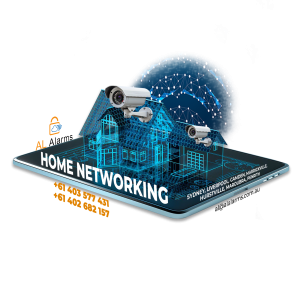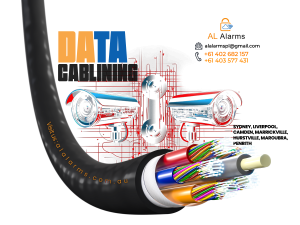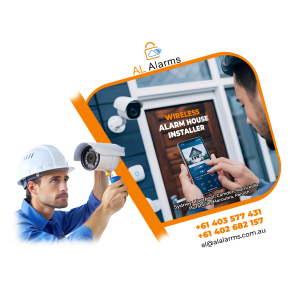For enhancing security, communication, and access control in both home and business environments, you need to consider Intercom Repairs Installation in Sydney, Liverpool, Camden, Marrickville, Hurstville, Maroubra, and Penrith areas .
An intercom system can be beneficial for both home and business use in various scenarios.
To grow your knowledge about them, this blog will help you clarify necessary details. Also, some important discussions will be done there on the DATA CABLING & DNVR. The explanation will broaden your view of choosing the right service provider in the end.
Intercom Systems | When do you need them ?
As the Intercom Systems are getting surging popularity, you need to know their application. Here are some of the most popular instances when an intercom system can be useful.
(i) Home Security :
The intercom systems at home provide a secure way to communicate with and screen visitors before allowing them access to the premises. This is especially useful for controlling entry into the house or communicating with individuals at the front gate or door.
(ii) Office Communication :
The intercom system inside a business can facilitate quick and convenient communication between different departments, offices, or areas of the building. This can improve overall efficiency and coordination within the workplace.
(iii) Business Access Control :
Within a business setting, intercom systems can be used to manage access to the premises, allowing for communication with visitors before granting them entry. This helps in enhancing security and controlling who enters the building.
(iv) Monitoring and Surveillance :
An intercom system with a video facility can be used for monitoring and surveillance purposes, providing visual verification of individuals seeking entry or monitoring specific areas of the property.
(v) Emergency Communication :
For any home and business environment, intercom systems can serve as a means of emergency communication, allowing for quick and direct communication during critical situations or emergencies.
What are the main advantages of IP intercom systems ?
Though the list of benefits from intercom systems is long enough, here are the most important ones. This will help you understand the fact that you should not be deprived of getting these benefits for your secure lifestyle or business.
(i) Flexibility :
With an intercom system, multiple users in a business can manage and handle calls from visitors. This is great for small businesses as it allows safe and secure access for suppliers, visitors, and more. If you have a small or medium business to handle, intercoms will come in handy.
The Access Panel with Intercom provides flexibility and convenience, seamlessly connecting via cellular, Wi-Fi, or Ethernet. It can operate as a regular access keypad at amenities, or as a security check at community entrances, with only one device needed for any number of units.
(ii) Fast, easy installation :
Intercoms are much easier to install than outdated analogue systems. They connect over your existing IP infrastructure, saving time and reducing disruption to the business.
(iii) Crime prevention :
To safeguard your site, any offensive entry and deed should be controlled. Modern technology has blessed us in this realm also. If you need to add an extra layer to your privacy and protection, you need to take the benefits of intercoms.
They are also very popular nowadays as many users reported for their Crime prevention facilities. Intercoms provide an extra layer of security and help in reducing and preventing crime by managing access to the building campuses or business premises.
(iv) Data capture for site visitors :
When you think of the importance of Data capture for site visitors, you must keep faith in the intercoms. The reason is that Intercom systems have some seamless advantages in Data capture for site visitors.
Whenever there is an input, they start tracking and logging visitor data, helping to resolve incidents and effectively manage health safety matters. This is great when you need to keep those data records with you for the safety of your home assets, store shops or business goods.
(v) Performance & quality :
Intercom systems offer better performance and quality than what an older analog system can provide at that point. The reason is that they are connected to the modern IP infrastructure. Modern Intercom systems allow users to screen allowable or unallowable visitors before they enter homes, buildings, stores, and business sites.
This can help you directly to prevent any unauthorized access. For being a two-way communication device, intercoms are great to effectively allow the visitor to respond to you as well as you to the visitor. It will be, therefore, possible to avoid any potentially dangerous occurrence involving forcible entrance in this manner.
(vi) Scalability :
With intercom, you can easily expand your system as your business grows, without the need for extensive cabling. The scalability of an intercom system refers to its ability to easily expand and adapt to the changing needs of a business.
New call points could be added without the necessity for extensive new cabling, and new users can be integrated into the system seamlessly. This reduces the costs and disruption associated with scaling up the intercom system, allowing the business to efficiently accommodate its growth while maintaining a high level of security and access control.
(vii) Company image :
We all know that a good brand image can help a company establish credibility within its industry. An intercom system has an important role in this regard also. When it can be installed in a fast and easy method, it can provide high-quality performance.
Also, you will be able to remain worry-free as the security level is enhanced to a higher level, preventing the chances of crimes and misdeeds on the site. Also, it enables fast and impressive access to your building. These all are important for creating a positive impression on the visitors.
(viii) Ultimate Security and peace of mind :
Video intercom systems let businesses see who is at the front door before letting them in, while audio intercom systems allow them to hear who is there. This is essential for keeping staff safe and protected. For creating a flawless operational flow and securing your site, it provides the ultimate peace of mind to both staff and visitors.
How to understand it is the right time for Intercom Repairs ?
Consider the below cases :-
(1) Malfunctioning :
If the intercom system is frequently malfunctioning or experiencing technical issues, it may be time for repairs.
(2) Poor audio or video quality :
If the audio or video quality of the intercom system is deteriorating, it may be a sign that repairs are needed.
(3) System outage :
Repeated system outages or disruptions in the functionality of the intercom system indicate the need for repairs.
(4) Difficulty in communication :
when there are difficulties in communicating with the intercom system, it may be a signal that repairs are necessary.
(5) Physical damage :
Physical damage to the intercom system, such as broken components or wiring, indicates the need for repairs.
(6) Inconsistent performance :
When the intercom system’s performance is inconsistent, it may be time to consider repairs to ensure reliability.
(7) Security concerns :
When the intercom system is not providing the expected level of security, it’s essential to address any issues through repairs.
(8) Aging system :
When intercom systems age, they may require repairs to maintain functionality and performance.
(9) Compatibility issues :
As the intercom system is not compatible with other security or communication systems, repairs may be necessary to address this.
(10) Customer/ staff feedback :
Feedback from the customer end or staff regarding difficulties with the intercom system can also indicate the need for repairs.
What to consider for Intercom Repairs Installation : Steps explained ?
To ensure the most reliable Intercom Repairs Installation, you should follow the best strategy. Unless your mission of getting ample benefits from the intercom system fails. Following the below ten points step by step will help you a lot in this case.
(1) Determine your specific needs :
Consider whether you need audio, video, or a combination of both for your intercom system. Assess the areas where you need intercoms installed and the level of access control required.
(2) Research intercom system options :
Explore different IP intercom systems available in the market. Look for features such as scalability, ease of installation, data capture capabilities, and compatibility with your existing infrastructure.
(3) Assess your infrastructure :
Evaluate your current IP infrastructure to ensure compatibility with the IP intercom system. Consider the power source for the intercoms and the availability of network connections.
(4) Plan the installation locations :
Identify strategic locations for installing the intercoms based on your security and access control needs. Consider factors such as visibility, access points, and coverage areas.
(5) Review installation requirements :
Check the installation requirements for the chosen IP intercom system, including any necessary mounting equipment, power sources, and network configurations.
(6) Obtain necessary permissions :
If required, obtain any necessary permissions or permits for installing intercom systems, especially for outdoor installations or shared spaces.
(7) Engage professional installers :
Consider hiring professional installers with experience in IP intercom systems to ensure proper installation and integration with your existing infrastructure.
(8) Test the intercom system :
Once installed, thoroughly test the intercom system to ensure that all features, including audio, video, and access control, are functioning correctly.
(9) Train staff on usage :
Provide training to relevant staff members on how to operate and manage the IP intercom system effectively, including granting access and monitoring visitors.
(10) Implement maintenance and support :
Establish a plan for ongoing maintenance and support for the intercom system to ensure its continued functionality and security. Consider factors such as software updates, troubleshooting, and technical support.
Also, Data Cabling in Sydney, Liverpool, Camden, Marrickville, Hurstville, Maroubra, and Penrith is very crucial for wired home intercoms, alarms and security camera installation. Let’s understand in detail.
What is DATA CABLING for wired home intercoms, alarms and security camera installation ?
Data cabling for intercom, alarm and security camera installation means the physical infrastructure that enables the transmission of data between security devices such as wired home intercoms, alarms, cameras, and monitoring systems.
This entails the installation of structured cabling systems to connect these devices to a centralised control or monitoring location. The data cabling here functions as the spine for transmitting video, audio, and control signals, allowing for seamless surveillance and security monitoring throughout a property. It is crucial to ensure that security systems function reliably and are interconnected for centralized management and control.
Why DATA CABLING is important for intercoms, alarms and security camera installation ?
The reasons behind DATA CABLING for intercoms, alarms and security camera installation should be understood also. Here in the below section, the important reasons will be explained.
(a) Reliable Connectivity :
Data cabling sustains a stable and reliable connection for intercoms, alarms and security cameras, minimizing the risk of signal interference or loss.
(b) High-Quality Transmission :
Appropriate data cabling allows for the transmission of high-quality audio and video signals, ensuring clear and detailed monitoring and recording.
(c) Remote Monitoring :
Well-organised data cabling enables seamless remote monitoring of security cameras and alarms, allowing for real-time surveillance and quick intercom response to security events.
(d) Scalability :
With the correct data cabling infrastructure in place, it becomes easier to expand and integrate additional security devices like intercoms, alarms and cameras as the need arises.
(e) Future-Proofing :
Investing in accurate data cabling for home intercoms, alarms and security cameras future-proofs the system, ensuring it can accommodate technological advancements and upgrades without major reconfigurations.
Digital, Network Video Recorders (DNVR) :-
For access, storage, and recording, you need a reliable system set up for Digital and Network Video Recorders in Sydney, Liverpool, Camden, Marrickville, Hurstville, Maroubra, and Penrith. Do you know why? Read the below points.
(i) Enhanced Storage: they offer ample storage space for video recordings, ensuring that footage is securely stored for future reference.
(ii) Remote Access: they allow for remote viewing of live or recorded footage, providing convenience and flexibility for monitoring security cameras from anywhere with an internet connection.
(iii) High-Quality Recording: These systems support high-resolution video recording, capturing clear and detailed footage for effective surveillance.
(iv) Easy Search and Playback: they facilitate quick and efficient search and playback of specific events, making it easier to review footage and extract relevant information.
(v) Integration Capabilities: they can integrate with other security systems and devices, enhancing overall security and providing a comprehensive surveillance solution.
Get the right service and supply :-
At AL Alarms, you will get the most simplified solution of repair plus installation for Intercom Systems, DVNR, DATA CABLING and wireless home Security System Cameras in Sydney, Liverpool, Camden, Marrickville, Hurstville, Maroubra, and Penrith. Contact them soon .




